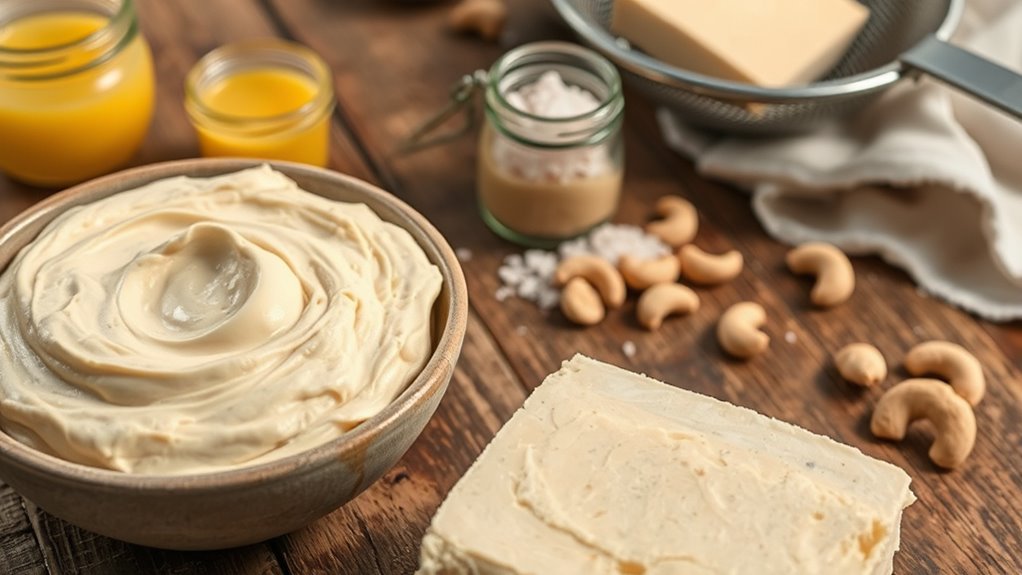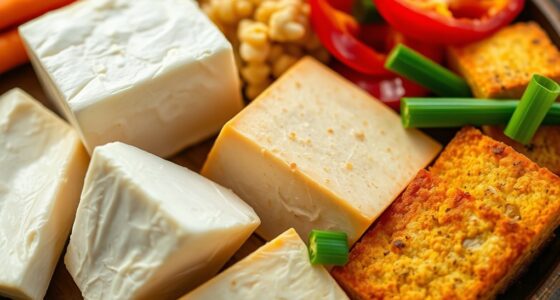When crafting vegan cashew cheese, enzymes play a key role by breaking down proteins and sugars, which enhances flavor, texture, and digestibility. The fermentation process encourages beneficial bacteria to develop complex, tangy flavors, especially with controlled temperature and humidity. Aging allows these enzymes and bacteria to deepen the taste, resulting in a richer, more cheese-like product. To discover all the tips for perfecting your vegan cheese, you’ll find the details that can elevate your craft.
Key Takeaways
- Enzymes in cashews and bacteria break down molecules, enhancing flavor, texture, and digestibility of the vegan cheese.
- Fermentation enzymes develop complex, layered flavors by breaking down proteins and sugars during aging.
- Proper aging allows continued enzyme activity, deepening tanginess and improving texture over time.
- Controlled fermentation environments promote beneficial bacteria growth and prevent spoilage, ensuring safety and flavor.
- Longer aging amplifies flavor complexity, sharpness, and creaminess, resulting in a more authentic, cheese-like vegan product.

Vegan cheese made with cashews is a delicious and versatile alternative to traditional dairy options. When you start crafting your own, understanding fermentation techniques becomes essential for achieving the right texture and flavor. Fermentation is what transforms soaked cashews into a tangy, complex cheese that’s rich in flavor and depth. You’ll find that applying the right fermentation techniques encourages beneficial bacteria to thrive, which in turn kickstarts the flavor development process. These bacteria break down sugars and proteins in the cashews, releasing unique flavor compounds that give your vegan cheese its signature tang and complexity. The key is to create an environment where fermentation can happen safely and effectively, usually by controlling temperature, pH, and humidity.
As you allow your cashew mixture to ferment, you’ll notice subtle changes in taste and aroma, signaling that the flavor development is progressing. This process can take anywhere from a day to several days, depending on your desired flavor profile. The longer you ferment, the more pronounced the tang and depth become. During fermentation, enzymes naturally present in the cashews and those introduced by beneficial bacteria work together to break down complex molecules. This enzymatic activity not only enhances flavor but also improves digestibility and texture, making the final product creamier and more cheese-like. You’ll be surprised at how dynamic and layered your vegan cheese can become through careful fermentation. Additionally, understanding the fermentation process is vital for troubleshooting and optimizing your results, especially for beginners.
Furthermore, maintaining a proper fermentation environment is crucial for promoting the growth of beneficial bacteria and preventing spoilage. Additionally, using proper equipment such as fermentation jars or controlled environment chambers can help ensure consistent results and prevent contamination. Creating optimal conditions for fermentation can significantly influence the flavor and safety of your cheese. After fermentation, aging your cashew cheese further develops its flavors. Aging allows the enzymes and bacteria to continue working, creating richer, more complex profiles. This step is pivotal for achieving that authentic cheese taste, as it mimics traditional aging processes used in dairy cheese making. During this period, you might notice the cheese becoming firmer, with a more intense aroma. Proper aging also helps develop the characteristic sharpness or tang, depending on how long you choose to age it. Keep in mind, the environment where you age your cheese matters—cool, dark, and consistent conditions will give the best results. Patience is key; the more you age, the more nuanced your cheese will become.
Frequently Asked Questions
How Long Does Vegan Cashew Cheese Typically Last?
You might wonder how long vegan cashew cheese lasts. Typically, its storage duration is about 3 to 5 days in the fridge if kept properly. Keep an eye out for spoilage indicators like mold, sour smell, or slimy texture. To extend its freshness, store it in an airtight container. If it shows any signs of spoilage, it’s best to discard it to avoid health risks.
Can Cashew Cheese Be Made Without Nutritional Yeast?
Yes, you can make cashew cheese without nutritional yeast by using nutritional yeast alternatives like miso or tamari, which add umami flavor. For enzyme substitution, consider using probiotic capsules or liquid probiotics to help achieve the desired texture and fermentation. These options can give your vegan cheese a cheesy flavor and smooth consistency without relying on nutritional yeast, making your recipe more adaptable to dietary preferences.
Is Vegan Cheese Suitable for People With Nut Allergies?
Is vegan cheese suitable for nut allergy sufferers? Think of it as a house built on a shaky foundation—most traditional versions contain nuts, making them unsafe. While nut allergy alternatives like seeds or soy exist, always check labels for cross-contamination. Store shelf life varies, but always prioritize safety. If you have a nut allergy, opt for specially labeled vegan cheeses that guarantee they’re free from nuts and safe to enjoy.
How Does Aging Affect the Flavor of Cashew Cheese?
Aging markedly impacts the flavor of cashew cheese by allowing fermentation duration to develop more complex tastes. As you age it, the cheese undergoes fermentation, which enhances its depth and richness, often adding tangy or nutty notes. Longer aging periods lead to more pronounced flavor development, giving your cashew cheese a sharper, more mature profile. This process helps you customize the flavor intensity to suit your preferences.
Are There Alternative Enzymes for Cheese Fermentation?
You wonder if there are alternative enzymes for cheese fermentation. Well, plant-based enzymes can step in, offering options like bromelain from pineapples, papain from papayas, or proteases from fungi. These fermentation alternatives can influence texture, flavor, and aging, just like traditional enzymes. By exploring these plant-based enzymes, you can craft unique vegan cheeses, experiment with flavors, and customize your cheese-making process to suit your taste.
Conclusion
Now that you know how enzymes and aging transform cashews into vegan cheese, imagine what’s next. Will you reveal the secret techniques to perfect texture and flavor? The journey doesn’t end here—you’re on the verge of creating cheeses that surprise and delight. Stay curious, experiment boldly, and soon you’ll discover the delicious possibilities waiting just beyond the horizon. Are you ready to take your vegan cheese craft to the next level? The adventure continues…









